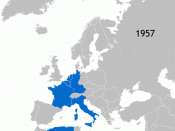The new found political and economic composition of Europe that was envisioned following the 1951 Treaty of Paris was a profound step towards the eradication of any future destruction that might threaten the desire for peaceful co-existence on European soil. Following the horrors of WWII, the process of European integration found its beginnings with the establishment of the European Coal and Steel Community in 1951 with six European countries - France, West Germany, Italy, Belgium, Luxembourg and the Netherlands - in an attempt to foster the first full customs union, which would serve as the foundation for the eventual development of the European Economic Community (EEC), later re-named the European Community (EC). The Treaty of Rome, in establishing the EEC in 1958, conceptualized a dynamic Europe to be an integrated regional economic and political union, "providing governance for a common market and organizing the steady growth of economic interdependence between the Member States".
This new European environment which sharply defied the prevailing Westphalian state model - based on territoriality and autonomy - sought to engage states in an "international contractual arrangement that establishes authority structures superseding territorial boundaries and transgressing autonomy". Such a task was achieved by the European Court of Justice (ECJ) through the constitutionalization of the Treaty of Rome, consequently cementing the "legal foundation for an integrated European economy and polity" and by the subsequent Treaties that followed.
The most significant feature of the European Court of Justice is undoubtedly the doctrine of supremacy of Community law, which has continued to be the cause of much confusion and controversy regarding its actual Treaty position and entailment. The EC Treaty does not expressly provide for supremacy - there is no Article which clearly states that Community law is supreme over the national laws of the Member States - however,


